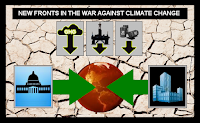The Encyclical of Pope Francis clearly states that fossil fuels are a leading cause of climate change causing emissions and as such we must reduce their use. He has called for stringent policies to restrict emissions and increased use of renewable energy.
"We know that technology based on the use of highly polluting fossil fuels — especially coal, but also oil and, to a lesser degree, gas — needs to be progressively replaced without delay. Until greater progress is made in developing widely accessible sources of renewable energy, it is legitimate to choose the lesser of two evils or to find short-term solutions. But the international community has still not reached adequate agreements about the responsibility for paying the costs of this energy transition."
One of the more interesting aspects of the encyclical effectively refutes the fossil fuel industry's argument that cheap energy is good for poor countries and helps lift them out of poverty.
The argument is that low energy prices lift poorer nations out of poverty. This is the view of ExxonMobil CEO Rex Tillerson, who rhetorically asked, “What good is it to save the planet if humanity suffers?”
The truth is that investing in a fossil fuel based economy will add to the considerable burdens of poorer societies and put them that much further behind the developed world. The pope has shown interest in places like Africa, and the continent has tremendous renewable energy potential that could leap frog fossil fuel infrastructure altogether.
The pope's anti-fossil fuel message adds to support from consumers, investors, governments.
Related
Pope Francis and COP21
Pope Deprives Republican Climate Deniers of Religious Support
Science Adds Weight to the Pope's Environmental Encyclical
Pope Francis' Moral Call to Environmental Action
The Pope's Encyclical is an Indictment of Capitalism
The Encyclical of Pope Francis Calls for Revolution
Implications of Pope Francis' Environmental Encyclical and Attacks from Republicans (Videos)
Pope's Environmental Encyclical Supports the Poor While Demanding Change from the Rich
Leaked Papal Encyclical Lauds the Climate Movement and Derides Deniers
Spoof of Pope Francis' Environmental Encyclical (Video)
Faith Based Environmental Leadership
"We know that technology based on the use of highly polluting fossil fuels — especially coal, but also oil and, to a lesser degree, gas — needs to be progressively replaced without delay. Until greater progress is made in developing widely accessible sources of renewable energy, it is legitimate to choose the lesser of two evils or to find short-term solutions. But the international community has still not reached adequate agreements about the responsibility for paying the costs of this energy transition."
One of the more interesting aspects of the encyclical effectively refutes the fossil fuel industry's argument that cheap energy is good for poor countries and helps lift them out of poverty.
The argument is that low energy prices lift poorer nations out of poverty. This is the view of ExxonMobil CEO Rex Tillerson, who rhetorically asked, “What good is it to save the planet if humanity suffers?”
The truth is that investing in a fossil fuel based economy will add to the considerable burdens of poorer societies and put them that much further behind the developed world. The pope has shown interest in places like Africa, and the continent has tremendous renewable energy potential that could leap frog fossil fuel infrastructure altogether.
The pope's anti-fossil fuel message adds to support from consumers, investors, governments.
Related
Pope Francis and COP21
Pope Deprives Republican Climate Deniers of Religious Support
Science Adds Weight to the Pope's Environmental Encyclical
Pope Francis' Moral Call to Environmental Action
The Pope's Encyclical is an Indictment of Capitalism
The Encyclical of Pope Francis Calls for Revolution
Implications of Pope Francis' Environmental Encyclical and Attacks from Republicans (Videos)
Pope's Environmental Encyclical Supports the Poor While Demanding Change from the Rich
Leaked Papal Encyclical Lauds the Climate Movement and Derides Deniers
Spoof of Pope Francis' Environmental Encyclical (Video)
Faith Based Environmental Leadership






















